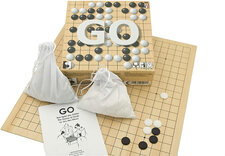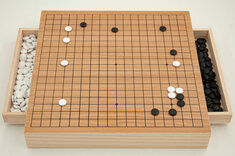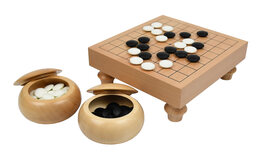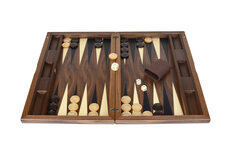Go
Wei Qi (or Wei-Ch'i) as it's known in China, Baduk (Paduk or Pa-dok) as it's known in Korea or "Go", as it is known in Japan, is considered by many people to be the worlds greatest strategic game, far surpassing Chess in its complexity. Wei-Ch'i means "surrounding game" or "surrounding chess" and the object is simply to capture territory by placing down counters on the board. The mathematical elegance of Wei Chi rules is complemented by the great beauty of the boards and stones - of all board games in the world, Go has been raised by the Japanese to a pinnacle of aesthetic beauty.
Go Sets
A superb range of complete Go sets, providing everything you need to play the game. All the sets are of a high quality and we have something to suit any requirement.
Go Boards, Stones & Bowls
A fine selection of quality Go Boards, Stones and Bowls to build your own complete Go set. Ranging in size and budget, we have a great choice to pick from.
Travel Go / Portable Wei-Chi Sets
Go sets that are magnetic so that you can play on the move
Go Sets for the Blind
A small range of Go Sets specially designed to be played and enjoyed by the Blind Community.
Wei Qi (also spelt Wei-Ch'i) as it's known in China, Baduk (Paduk or Pa-dok) as it's known in Korea or Go, as it is known in Japan and generally in the West, is considered by most Oriental game experts to be the worlds greatest strategic skill game, far surpassing Chess in it's complexity and scope. Wei-Ch'i means "surrounding game" or "surrounding chess" and the object is simply to capture territory by placing down counters on the board. Wei Qi is the most perfect of board games from several perspectives. Of all the serious board games, Go has the fewest rules and yet, the game itself is is the most intellectually challenging. An order of magnitude more complex than Chess, most people thought that no computer program would ever be able to beat the best Go players but in 2016 this was proved wrong when Alpha-Mind and learning algorithm owned by Google managed to beat the current World Go Champion. The mathematical elegance of the rules is complemented by the great beauty of the boards and stones - of all board games in the world, Go has been raised by the Japanese to a pinnacle of aesthetic beauty. According to Chinese history, Wei-Ch'i was invented by Emperor Shun (2255 - 2206 BC) to help develop the intelligence of his son, Shokin. A alternative version attributes the invention of Go to U, who lived during the reign of Emperor Kieh Kwei several hundred years later. Under non-Chinese history, it is thought more likely that the game originated in central Asia from where it spread eastwards through Nepal and Tibet to China. The Go board can either be a flat table board or the more traditional floor-board with legs (Go-ban). The wood used, the quality of the grain and how the grain is oriented is of prime importance. Most common are Itame boards in which the grain is bent or irregular. Better boards are Masame which means the grain runs straight across the top of the board. Best of all are Tenmasa Masame boards that have grain running from bottom to top as well as straight across the top. The best Go stones are made of slate and clamshell and the quality and the grain on the clamshell matters. There are two grades of Go stone based on the white pieces, Yuki - snow white and jitusyo - ordinary. The thickness of the stones varies according to personal taste. There is a knack to playing a stone - it should be held between the index and middle fingers and placed with an audible click. The Go bowls which hold the stones should also be of good quality wood with straight grain. You can learn more about the History of Go from the Online Guide to Traditional Games.















































